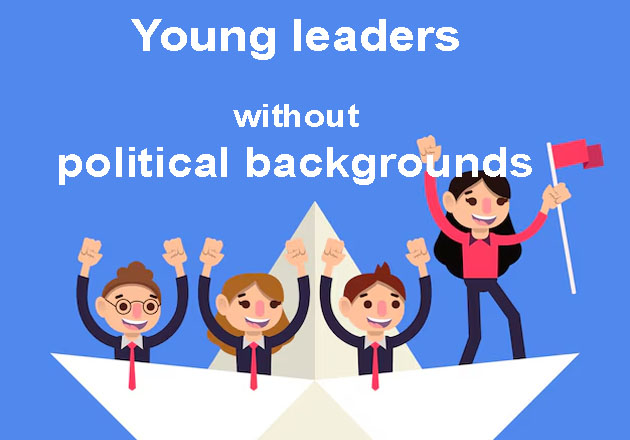Dr Priyanka Saurabh
Today, the country needs to empower young leaders who do not come from political families. India needs to break free from the constraints of dynastic politics. Youth have a role to play in politics and governance, especially about the challenges posed by nepotism and dynastic succession in Indian political life. Historically, youth leadership has been important in various sectors such as industry and technology. Young leaders have often been at the forefront of innovation, especially in technology, where their contributions have revolutionized industries. In India, where more than half the population is under 25, the average age of elected representatives in the 18th Lok Sabha is 56 years, highlighting a significant disconnect between the youth demographic and those who represent them in government. India must harness its youth power to strengthen its core democratic principles and promote youth participation in politics and democracy.
Indian politics is defined as a “young country, old leader”. Most of the young leaders who have made their mark in Indian politics belong to big political families, which are extremely influential socio-politically. Although almost every mainstream political party has its student wing, and all these parties participate vigorously in student union elections in colleges and universities, there is no systematic mechanism in place that can help and guide student leaders to advance in legislative politics. For example, the number of MPs under the age of 40 in the 17th Lok Sabha (2019-2024) is just 12 percent, while in the first Lok Sabha of independent India, 26 percent of MPs were under 40 years of age.
Notably, before (every major) election, political parties talk about launching ambitious programs for youth in their manifestos, which are heavily publicized through newspapers and social media. Political outreach campaigns involve youth on a large scale, and political parties publicize youth participation in election rallies as a show of strength. However, youth issues (education and employment) are not given priority after the election, which reflects the weakness of youth in electoral politics as they cannot put forward their demands strongly. Even when student leaders participate in legislative elections, they have very limited political bargaining power. Thus, it seems that if youth voter participation is low, it is not a strange phenomenon but an expected outcome.
Nepotism and dynastic politics present significant barriers for young leaders without a political background. These entrenched systems limit access to the resources, opportunities, and platforms needed for emerging leaders to gain visibility and influence. Today, the country has the potential to see 1 lakh young individuals without any political legacy entering politics. However, to realize this potential, it is essential to provide the right opportunities, guidance, and support systems for these individuals. Changing the political culture to be more inclusive of young leaders implies a significant shift in mindset within both the established political class and the electorate. This change can pave the way for a new generation of leaders who can bring fresh perspectives and innovative solutions to governance.
Comparative Analysis: In the technology and business sectors, young leaders have made a profound impact. People like Larry Page, Mark Zuckerberg, and Elon Musk have revolutionized entire industries at a young age. The IT industry in India, dominated by young professionals, has brought the country substantial economic benefits and global recognition. In contrast, despite a large youth population, the political landscape lags far behind in youth representation. This disparity highlights a critical area where reform is necessary to align political leadership with the demographic realities of the nation. Various government initiatives aim to encourage youth participation in governance, such as the National Youth Parliament Scheme and the National Youth Policy. However, these need to be implemented and expanded more effectively to create genuine pathways for young leaders to enter politics. The UN Secretary-General’s Envoy on Youth initiative aims to address age discrimination in politics and promote youth participation in governance.
Collaboration between UNDP, OHCHR, and the Inter-Parliamentary Union has resulted in joint efforts to increase youth representation in political processes globally. The ‘Not Too Young to Run’ campaign is a global initiative to raise awareness of the barriers facing young people in politics and to advocate for lowering the age to run for public office. Despite these efforts, less than 2% of elected legislators worldwide are young people. This requires encouraging capable young individuals to enter politics based on merit rather than family connections. This could include creating platforms for young leaders to gain experience and recognition, such as youth wings of political parties or mentorship programs. Implement reforms aimed at providing financial support, training, and opportunities to young leaders who do not have a political background.
Such reforms could include reserved seats for young candidates or incentives for parties to field young candidates. A change in the mindset of the current political class is vital. A genuine effort is needed to welcome and promote young talent, who can bring fresh perspectives and innovative ideas to governance. India’s political parties and policymakers need to find ways to reach out to youth and encourage them to participate in the country’s development journey. Apart from the question of representation, increased youth participation will also give more importance to issues related to them. Apart from the traditional challenges related to education and employment, governance must also address several other issues affecting youth.
As India is the world’s most populous country, with the largest youth population in the world, India should take advantage of this situation and make full use of its youth power to strengthen the country’s democratic system and promote youth participation in politics and democracy. Keeping in mind the aspirations of youth in a rapidly changing world, Indian policymakers must ensure youth participation in the country’s political and democratic processes. Only by doing this can India harness the potential of its young population, ensuring that the political landscape is more representative of the country’s demographics and better equipped to face future challenges.


